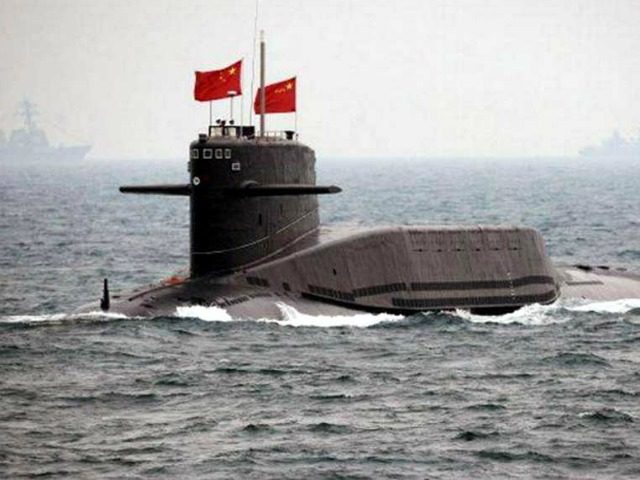After months of expanding its military capabilities in the South China Sea, the Chinese military is preparing to deploy nuclear-armed submarines to the Pacific Ocean, according to a report published Thursday in The Guardian.
Reporter Julian Border cites Chinese military officials as saying that Beijing has made the decision to send nuclear missile-laden submarines into the Pacific. It would be the first such deployment of nuclear weapons. Border notes that his sources did not specify a timeframe in which the submarines would take to the seas.
The objective of such a deployment, he suggests, is to allow the Chinese military to execute a nuclear strike much more quickly. “Warheads and missiles would be put together and handed over to the navy, allowing a nuclear weapon to be launched much faster if such a decision was taken,” Borger writes.
The news follows months of increased tensions between the United States and China over a variety of Asian security issues. Borger cites his sources as claiming that paramount among these is the plan to bring a Terminal High-Altitude Area Defense (THAAD) missile system to South Korea. Seoul and Washington agreed on placing the American technology in South Korea following North Korea’s firing what it alleged was a hydrogen bomb in January, though most experts believe the blast was only big enough to come from a hybrid fusion-fission nuclear weapon. China has adamantly opposed the installation of such a system, arguing that its range is too wide for them to believe it is only targeting Pyongyang, and can hit a number of high-value Chinese targets if the United States sees a need to do so.
The struggle to curb North Korea’s nuclear ambitions is second to tensions between China and the United States regarding territorial claims in the South China Sea, however. China imposed new borders that grant it sovereignty over territories owned by the Philippines, Vietnam, Taiwan, Malaysia, and Brunei in 2012. Beijing has funded the construction of numerous artificial islands – and aircraft landing strips to allow for the landing of fighter jets – as well as building a weapons arsenal on the Spratly and Paracel Islands.
The Chinese government has repeatedly justified its militarization of the region by claiming the United States has forced it into defensive construction. “China’s construction in the South China Sea came later than other countries’ illegal activities in the region,” Foreign Ministry spokeswoman Hua Chunying said at her regular briefing Wednesday.
America has called on China to stop building military facilities on Philippine and Vietnamese territory in the Spratly and Paracel Islands, and the Philippines has filed suit at the Permanent Court of Arbitration at The Hague. Chinese officials have asserted they will disregard any decision by The Hague, regardless of outcome.
The Chinese government has reacted to America’s support for its allies’ territorial claims in the region by accusing the United States of exacerbating tensions and demanding America remove its military hardware from the region. Most recently, Chinese fighter jets intercepted a routine U.S. patrol in the South China Sea, threatening the security of American soldiers. The Pentagon has protested, calling the interception “unsafe” and demanding the Chinese military proceed with caution in the region. Secretary of State John Kerry, currently in Vietnam, issued a statement condemning the Chinese move: “I would caution China to not unilaterally move to engage in reclamation activities and militarization of islands.”
The Chinese Defense Ministry responded by accusing the United States of fueling tensions in the region, calling America’s presence there “the real source of danger for Sino-U.S. military safety at sea and in the air.” The routine aircraft missions by the U.S. Air Force and Navy, the Ministry alleged, “seriously endanger Chinese maritime security.”
In Vietnam Monday, President Barack Obama reiterated the Department of Defense’s line on activity in the South China Sea: “The United States will continue to fly, sail, and operate wherever international law allows, and we will support the right of all countries to do the same.” He also announced an end to the arms embargo against Vietnam, a move that Chinese media have interpreted as a threat to China’s expanded presence in the South China Sea.
“Obama claimed that this move is not aimed at China, yet this is only a very poor lie which reveals the truth — exacerbating the strategic antagonism between Washington and Beijing,” China’s Global Times alleged in a column Tuesday. The end to the arms embargo, a China Daily column argued, was meant to “compromise China’s national interests and threaten regional security.”
The Chinese government proper has reacted less sternly towards the move, calling the arms embargo a “relic of the Cold War” but demanding the United States end all its arms embargoes against all countries, including China. “American public figures on many occasions have said that implementing arms embargoes are a manifestation of Cold War thinking,” Chinese Defense Ministry spokesman Yang Yujun said in a press conference. “We think that the United States ought to abandon its Cold War thinking and put an end to such acts that do not accord with the times.”

COMMENTS
Please let us know if you're having issues with commenting.